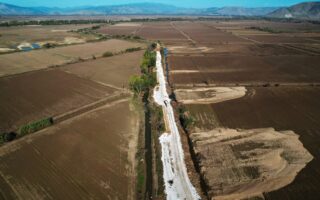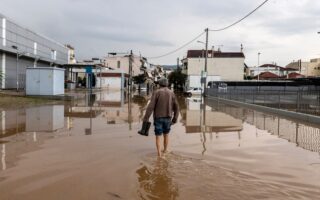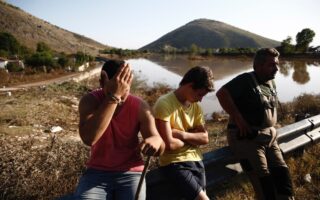A healthy diet for people and the environment

The climate crisis is becoming a direct threat to all. Extreme weather phenomena are accelerating in frequency and intensity, provoking death and disease, social and economic turmoil. Greece, Cyprus and other parts of Southern Europe are on the front line. It is possible that in 10 years their environment will resemble that of the Middle East.
There is a pressing need to reduce emissions of greenhouse gases, as the Earth’s average temperature is heading towards being close to 3 degrees Celsius higher than pre-industrial levels at the end of the century, almost double the target set by international agreements. Fossil fuels account for 70 percent of these emissions, food production for the other 30 percent. If humanity were to adopt a healthier diet, if it applied sustainable methods of food production, this could be halved, to 15 percent.
Scientists who study the problem propose solutions. But developments demand faster procedures, more initiatives, so that this knowledge can be translated immediately into effective policies. This was the subject of a very interesting discussion organized by the Academy of Athens’ Center for Public Health Research and Education and Harvard’s T.H. Chan School of Public Health (HSPH) at this year’s Delphi Economic Forum.
“We need to listen to each other and come up with solutions that benefit everyone,” said Walter Willett, professor of epidemiology and nutrition at HSPH, one of the world’s leading scientists in the field. He noted that shifting to a model such as the Mediterranean diet would have health benefits, would reduce greenhouse gas emissions and would lead to economic savings.
Antonia Trichopoulou, member of the Academy of Athens and a pioneer of research into the Mediterranean diet, stressed that this is not simply a diet but also social practice based on skills, knowledge and tradition. It is a model for sustainable nutrition with a low burden for the environment.
Klea Katsouyanni, professor of public health at London’s Imperial College, focused on the impact of climate change, food systems and other environmental exposures on health. She highlighted the threat posed by air pollution and “non-optimal temperature,” especially when they combine, adding that social inequality amplifies this. Petros Koutrakis, professor of environmental science at the HSPH, presented the problems faced by Greece and the need for new models of production. He called for a national strategy that is not dependent of the European Union, as countries do not all face the same challenges. He noted the need to safeguard the health of people and to protect the environment from the consequences of the climate crisis.
In a video presentation, Kari C. Nadeau, John Rock Professor of Climate and Population Studies at the HSPH, presented the three key pillars of food system transformation, “Consumption: shifting diets towards healthy plant-based diets consistent with Mediterranean diet principles. Production, processing, distribution: improving agricultural production methods. Reducing food waste and loss.”
Lluis Serra Majem, rector of the University of Las Palmas, sent a message presenting an initiative for spreading the need for a sustainable diet, like the Mediterranean one, in Latin America and Africa. The mission will be undertaken by a task force of six distinguished women to whom his university has awarded honorary doctorates.
The aim of Wednesday’s session (and of a discussion the previous day which included officials from the ministries of Economy and Rural Development) was to find a way for the scientists’ knowledge to contribute towards shaping policy for managing the climate crisis’ fallout, for the sustainable cultivation of products based on better nutrition models. Working groups will be established for this. Rural Development Minister Lefteris Avgenakis, who took part in Wednesday’s discussion, welcomed the initiative and explained his ministry’s priorities and policy.
This discussion may not have been on Delphi’s center stage. But it is a substantial step towards the necessary cooperation between science and politics, between various ministries. It also provided the crucial knowledge that this existential crisis demands.





